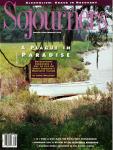Bookstore shelves are sagging under the weight of countless self-help books these days. Many preach the rhetoric of self-actualization. A few attempt to include some spiritual component - often of a New Age bent. All seek to feed the hunger within our culture for a guide to balanced and healthy living.
The Wholeness Handbook represents a welcome, Spirit-filled addition to this genre. Co-authors Elaine Emeth, a Christian spiritual director, and Janet Greenhut, a Jewish physician committed to preventative health care, claim the sacredness of life and the value of self-care. Their invitation to integrated, healthy living is punctuated with authenticity and hope. The Handbook outlines a wholeness paradigm that encourages self-awareness and change through a systems approach to understanding sickness and health.
I was first introduced to this book last fall during a seminar with Emeth. To say I was captivated by the life-giving vision she freely shared would be an understatement. As a 22-year-old seeking role models and resources in the art of living, I was hooked. The Wholeness Handbook was at the top of my Christmas wish list a month later, and I'd devoured it before New Year's Eve rolled around.
Aptly named, for it is a handbook, this work is structured for use as a reference guide and is chock full of accessible, practical information. Thorough discussions of nutrition, exercise, and disease prevention are balanced with an exploration of classical spiritual disciplines and thoughtful perspectives on healthy relationships and the building up of community.
Emeth and Greenhut are committed to demystifying both the medical and spiritual realms. I finally got clear on the difference between "good" and "bad" cholesterol, and when I'd finished the section on meditation and prayer, I felt affirmed and inspired rather than uninformed and burdened.
The book offers a comprehensive overview of the wholeness landscape. It does not attempt to share exhaustive detail on every related topic. For that, excellent notes and the recommended reading section point to more specific resources. Much to their credit, the authors emphasize the essential distinction between healing and curing without devaluing either art. Health care professionals are challenged to embrace a radically different approach without being "bashed," as is too often the case.
INCLUSIVITY and integration are clearly the constant refrain in The Handbook's message and structure. The decisions to publish under the secular imprint Continuum and choose an equally inclusive cover were intentional attempts to reach a broad audience. Yet no degree of spiritual integrity is sacrificed in this effort, as the book is well-grounded in the Judeo-Christian tradition of its authors.
Emeth and Greenhut draw on the harmony and diversity of their own faith backgrounds as they quote scripture, offer prayers, and name God as the giver of life and the true healer. The book avoids laying out a prescription for health and happiness, offering instead a smorgasbord of choices and the liberating message that choosing life for yourself need not be selfish.
Particularly helpful to me was the reminder and revelation that " 'Spiritual life' is not a separate little compartment in one's life or psyche or schedule; it is how we live our lives." Too often overextended or distracted, I find challenge and comfort in the section "Creating Space for the Holy." The authors recognize time as opportunity rather than enemy; name our need for silence and solitude; and affirm that "change toward wholeness is God's work, not ours," calling us to the task of making space in our lives for such transformation.
The Wholeness Handbook is especially helpful for those seeking intentionality in their lives. It invites us to abandon the trap of self-sacrifice and opt for a truer kind of simple living - one that fosters health, healing, and sacred personal space within the context of community.
Anyone disinclined to read a book that's too self-focused or privatized need not fear. Much to the contrary, this book reclaims the personal as political. Implicit in this paradigm of health and wholeness lies an incisive political analysis. Were each of us to fully claim such radical personal health and abundance of life, the political implications would be immeasurable.
The Wholeness Handbook: Care of Body, Mind, and Spirit for Optimal Health. By Elaine V. Emeth and Janet H. Greenhut, M.D. Continuum.
Susanne Walker was an editorial intern at Sojourners when this article appeared.

Got something to say about what you're reading? We value your feedback!
